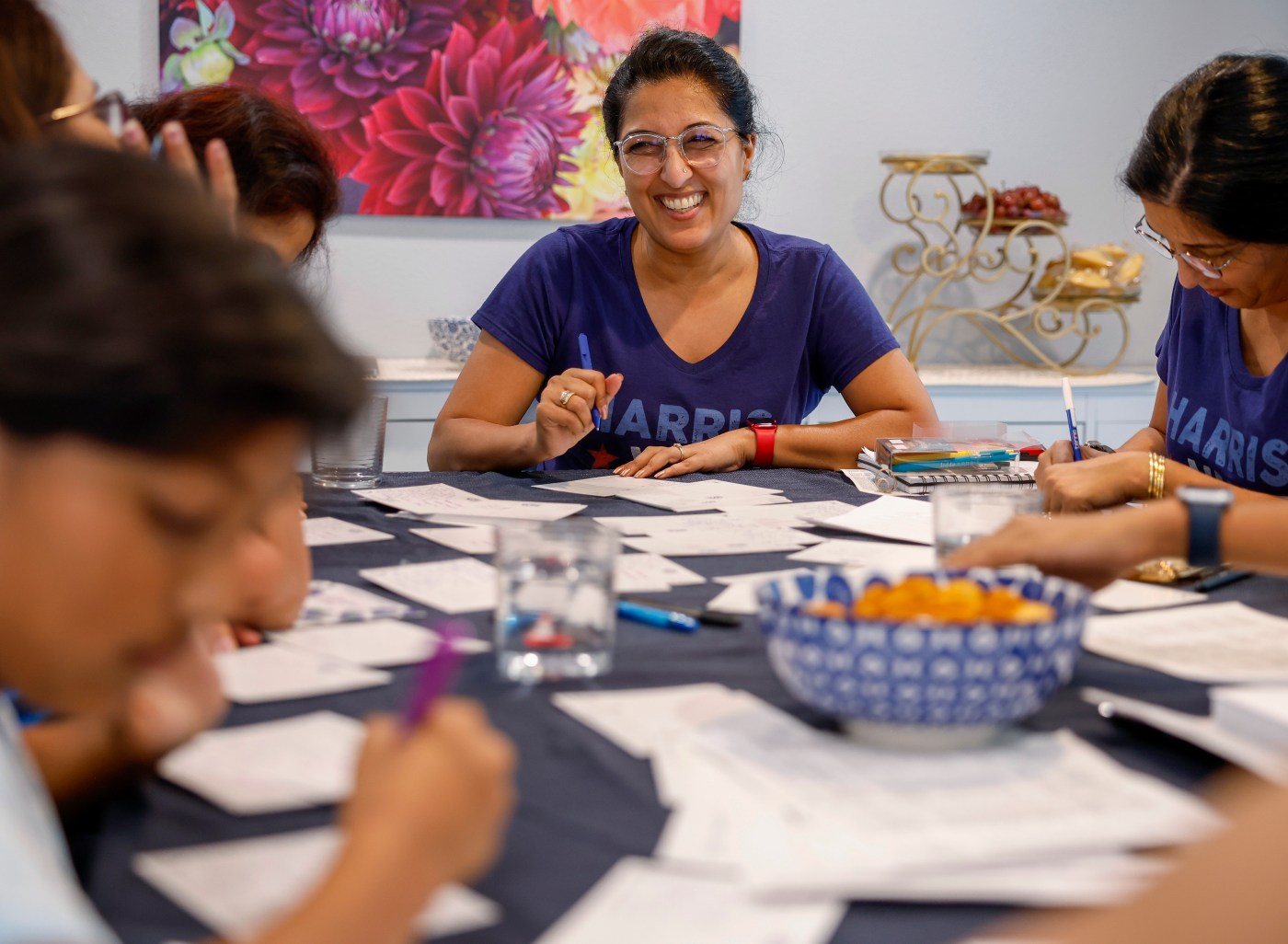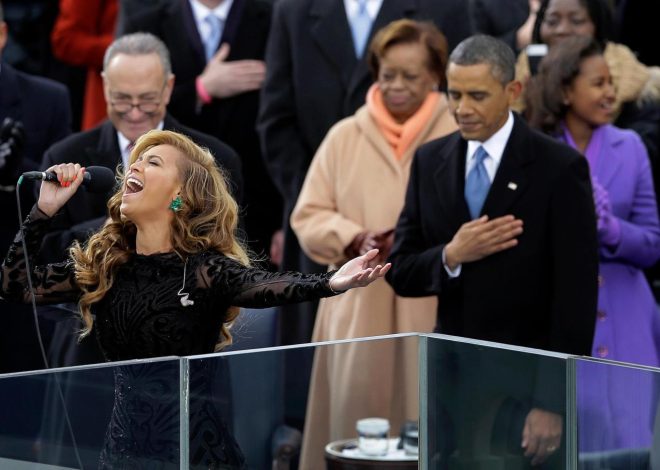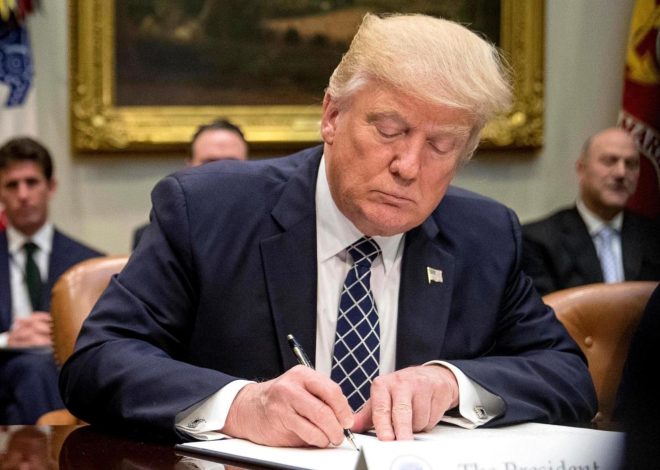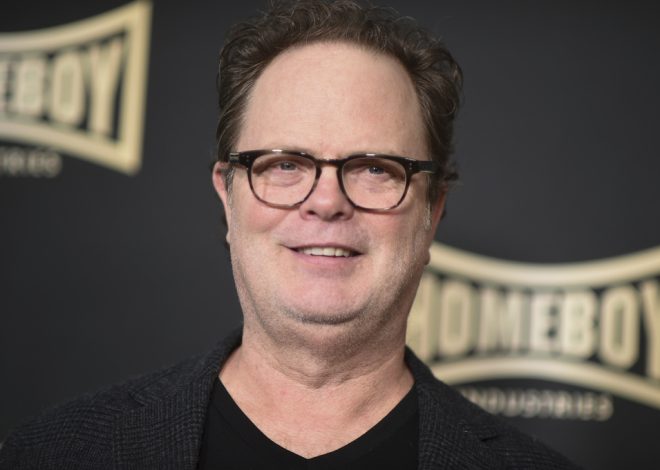
‘Lotus for POTUS’: How the Bay Area’s South Asian diaspora has been drawn in to this year’s presidential race
Aarohi Dalal and Anshu Jain won’t be able to vote in November’s general election — Dalal, at 15, is too young, and Jain does not have U.S. citizenship.
But that’s not stopping the Milpitas mother and daughter from getting involved in this year’s unprecedented presidential race, with Kamala Harris, the child of an Indian immigrant, attempting to make history as not only the first woman elected as president of the United States but also the first president with South Asian heritage. Both Dalal and Jain have been involved in a letter-writing campaign to persuade other South Asian people in swing states to vote for Harris.
Anshu Jain, left, and her 15-year-old daughter Aarohi Dalal at their Milpitas home on Friday, Oct. 18, 2024. (Dai Sugano/Bay Area News Group)
They’re not the only ones.
For many of the hundreds of thousands of Bay Area residents with South Asian roots, Harris’ roots in the region and background as an Indian woman — even if they see it as secondary to her policies — have increased their interest in this year’s presidential race.
Jain, who has lived in the Bay Area for 17 years, said she had never involved herself in politics before Harris became the Democratic nominee after President Joe Biden dropped out of the race in July.
“Just the fact that a person, a child of immigrants, she could get to such a position within our political system and is contending to be a president, that’s kind of a big deal for me,” Jain said.
Indian-born residents are the largest population of immigrants in Santa Clara and Alameda counties, the two largest counties in the Bay Area, with a combined population of 250,000 first-generation immigrants in both — and that could have an impact on the election.
They See Blue, a Bay Area-based organization that seeks to mobilize South Asian voters to support Democratic candidates, is a testament to the size and influence of South Asian Bay Area residents. The organization was created in 2018 after its co-founders were frustrated with former President Donald Trump’s administration. Its membership swelled after Biden dropped out and Harris rose, co-founder Rajiv Bhateja said.
“I would say the engagement level just blew up. It just exploded,” he said.
“They see” is a pun on the word “Desi” — another term used to refer to people of South Asian descent. Bhateja said they chose the name because South Asian people would understand it, but it would still be accessible if non-Desi people were interested in getting involved.
They See Blue now has chapters all over the country, and has been helping supporters host “postcard parties” — events where they meet to write cards to other South Asian people in swing states, urging them to vote for Democrats this year. Attendees at the postcard parties will often customize their notes and write them in South Asian languages like Punjabi or Gujarati if the origin of a recipient’s name indicates that they may understand them. Bhateja said.
In addition to the roughly 200,000 handwritten postcards the group has sent out, it has also put out radio and TV advertisements in at least nine different South Asian languages, and its members often try to phone bank and canvas in the native language of the person they’re speaking to.
“We really try to leverage our relational connection with these voters,” he said.
South Bay resident Radhika Rangarajan is excited about the possibility of a Harris presidency — it means Harris could be someone her two daughters could look up to, she said. In addition to talking politics at the postcard parties, Rangarajan is also gearing up to pitch a Harris presidency at family gatherings this month, since Election Day this year is also four days after the Hindu holiday Diwali.
Akin to discussing politics around the Thanksgiving dinner table, Rangarajan is expecting the topic to come up as she celebrates Diwali and the events that precede the annual festival of lights.
“As long as we all actually stay within the boundaries of civility, it’s fine. That’s what makes these gatherings very exciting to be very honest,” she said with a laugh.
On the other hand, California Republican National Committeewoman Harmeet Dhillon said Donald Trump’s policies might appeal more to the Bay Area’s South Asian diaspora. Dhillon said her dad was a doctor in India and had to redo much of his medical training when he legally came to the United States to practice here. For people like him, Trump’s efforts to crack down on illegal immigration could be a draw, she said.
Dhillon said she’s supportive of Trump because of his policies but also feels that Harris hasn’t done much to appeal to South Asian people in the United States.
“The only time she ever engaged and identified as South Asian was in some media stories in the South Asian press and in fundraisers,” she said. “Otherwise, she did not identify with the South Asian community, and now she’s sort of changed that over the years to get votes, but it isn’t authentic to me.”
Dhillon said she doesn’t think Usha Vance, J.D. Vance’s wife, and her Indian-American background has drawn in voters either — though “it’s a nice footnote,” she said.
South Asian people in the Bay Area have also been taking part in the election in less traditional ways. Abhay Dandekar, a pediatrician from the East Bay, was in between seeing patients when he heard the news that Harris was likely to be the Democratic candidate, and quickly threw together a black-and-white photo of her with the text that read “In Sanskrit, Kamala means LOTUS. In America, Kamala means POTUS.”
After posting it on Instagram, the post spread like wildfire, making its way through WhatsApp group chats around the country. A Google search of “Lotus for POTUS” today results in hundreds of T-shirts, stickers, pins and other merchandise brandishing the slogan.
Dandekar said he didn’t expect it to have such an impact but felt like it was a snapshot of the sentiment that many South Asian people in the United States shared when Harris became the nominee.
“There was just a lot of joy and exuberance then, so I think it sort of, more than anything else, captured that exuberance and really framed it around what our community represents when it comes to the Indian-American experience,” he said.
For still other South Asians in the Bay Area, Harris’ identity is an added bonus to the policies she supports. San Jose resident Shachi Patel has been interested in politics since she first volunteered with Barack Obama’s campaign in 2008 and this year is no exception — though it’s what she sees as Harris’ overall competency for the job of president that drew Patel’s support.
“It doesn’t matter — gender, ethnicity, and all that,” she said. “You have to do work, and this is hard work. And we need to have people who are going to actually do the work.”
Dandekar agreed. “As far as I’m concerned, her identity is a great way for people to relate to her, but they’re not to distract from her record and her agenda and her policies.”


